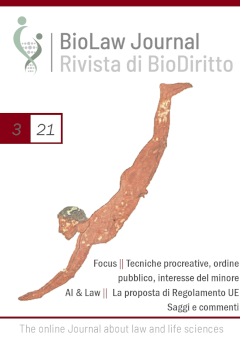Il giudice al crocevia tra fattore tecnico-scientifico e complessità assiologica dei casi. Riflessioni a partire dalla giurisprudenza italiana
DOI:
https://doi.org/10.15168/2284-4503-1803Parole chiave:
Science, jurisdiction, techno-scientific issues, science autonomy, beginning and end-of-life issuesAbstract
Moving from the recognition of a mutually influential relationship between the evolution of bio-law and the role of the judge in contemporary societies, the article aims to offer a systematisation of the main approaches that courts tend to adopt when faced with scientifically characterised cases. The proposed classification is based on the function that scientific data can play within the judicial reasoning, as an instrument of recognition and exercise (at least potential) of fundamental rights of the person, as it happens in the context of the beginning of life; or, alternatively, as a context of manifestation of these rights, and of the more general ethical, scientific, and social pluralism that characterizes the issues of bio-law (end of life).





